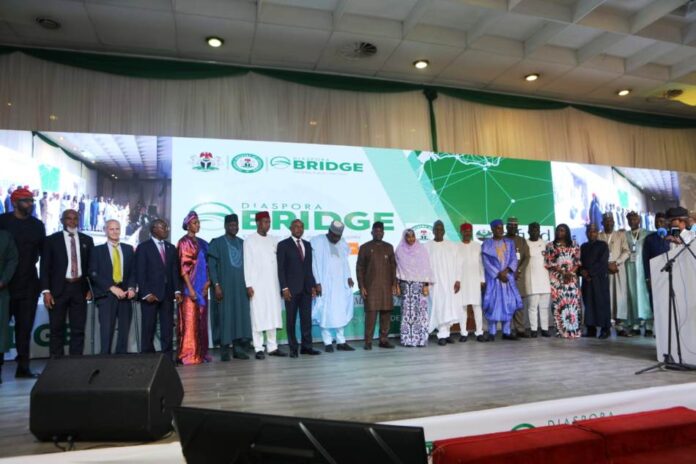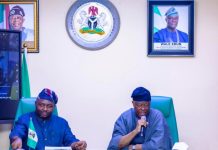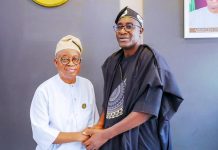
At the formal launch of the Diaspora BRIDGE Programme in Abuja, the Vice President of the Federal Republic of Nigeria, Senator Kashim Shettima, GCON, praised the Honourable Minister of Education, Dr. Maruf Tunji Alausa, for convening a broad coalition of stakeholders committed to revitalizing the Nigerian education sector. Represented by the Deputy Chief of Staff, Senator Ibrahim Hassan Hadejia, the Vice President described the initiative as a significant step toward building enduring partnerships between Nigerian professionals abroad and institutions at home. “This initiative is a deliberate and commendable effort to align global expertise with national priorities,” he said. “It reflects a clear vision and the collective resolve to elevate educational standards and restore trust in our institutions.”
Speaking at the event in his keynote address, Minister of Education Dr Maruf Tunji Alausa CON emphasized that the Diaspora BRIDGE Programme is more than a platform; it is a framework for long-term collaboration. “Our goal is to systematically reconnect with Nigerian professionals abroad and make their expertise accessible to our universities, polytechnics, and colleges of education,” he said. He noted that the programme aligns with President Tinubu’s Renewed Hope Agenda by promoting knowledge exchange, capacity development, and institutional strengthening across key sectors.
Dr. Alausa explained that the programme was developed through consultations with academic leaders, policymakers, diaspora associations, and development partners. “We listened carefully to the gaps identified by our institutions and the willingness expressed by our diaspora to contribute. The result is a platform designed for mutual accountability, measurable outcomes, and real-time engagement between stakeholders,” he said. He added that integration with TETFund’s TERAS system will enable transparent tracking of project milestones and impact.
In outlining the implementation phase, the Minister stated that the platform will allow diaspora professionals to register, upload their credentials, and specify preferred areas of contribution ranging from guest lecturing and joint research to mentorship and curriculum development. Institutions, in turn, will be able to assess their internal needs and initiate collaboration requests. “It is a two-way mechanism built for flexibility, transparency, and institutional autonomy,” he said.
The Minister of State for Education, Prof Suiwaba Sai’d Ahmad highlighted the grassroots support for the initiative, noting that early feedback from institutional heads and faculty members has been overwhelmingly positive. “We have heard firsthand from rural universities and colleges that see this as a transformative tool for bridging expertise gaps. It is important that no institution regardless of size or location is left behind,” she said.
Professor Ahmad emphasized the importance of institutional cooperation, particularly between the Federal Ministry of Education and the Nigerians in Diaspora Commission (NIDCOM). She explained that such collaboration ensures the creation of a transparent, accessible, and well-structured framework through which diaspora professionals can contribute meaningfully to Nigeria’s education system. “BRIDGE represents a new era of partnership,” she said, “anchored on national pride, intellectual exchange, and mutual development.”
In a joint statement, State Governors, including Governor Peter Mbah of Enugu State, Plateau State’s Deputy Governor, Hon. Josephine Piyo, and the Deputy Governor of Kaduna State, Dr. Hadiza Sabuwa Balarabe endorsed the BRIDGE Programme as a critical step toward building a globally competitive education system. They pledged to align their respective education policies with the initiative by facilitating infrastructure upgrades, encouraging institutional participation, and supporting the integration of diaspora experts into state-led development efforts. “This is a national priority, and we are fully committed to its success,” the governors affirmed.
In their contributions and goodwill messages, Minister of Foreign Affairs, Yusuf Tuggar, described the platform as a necessary ideological shift that would enhance education and reduce migration pressures through remote collaboration. Coordinating Minister of Health and Social Welfare, Prof. Muhammad Ali Pate, emphasized that BRIDGE signifies a deepening of trust and shared responsibility between diaspora professionals and local institutions, crucial for national capacity building. Minister of Science and Technology, Chief Uche Geoffrey Nnaji also praised the initiative as timely and essential for reconnecting Nigeria’s intellectual capital with national research priorities in an innovation-driven economy.
Hon. Abike Dabiri-Erewa (OON), Chairman/CEO of the Nigerians in Diaspora Commission (NiDCOM), commended the programme as a timely and strategic intervention. “BRIDGE gives us the infrastructure to turn intention into action. Every young Nigerian deserves the chance to learn from the best minds, whether they are within our borders or beyond them,” she said. She also encouraged diaspora professionals to participate actively by mentoring students, hosting workshops, donating equipment, and partnering with institutions on collaborative projects.
Mr. Abel Olumiyiwa Enitan, Permanent Secretary of the Federal Ministry of Education, concluded by emphasizing the Ministry’s commitment to ensuring the sustainability of the programme. “This initiative reflects a timely and strategic connection between our national development goals and the expertise of Nigerians across the globe,” he said. “Our focus moving forward will be on structured implementation, accountability, and measurable results that strengthen the education sector for future generations.”
Signed
Boriowo Folasade
Director Press and Public Relations





